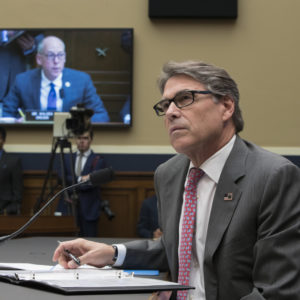I recently joined 74 of America’s most accomplished national security experts in authoring a letter to Energy Secretary Rick Perry, urging him to ensure nuclear power plants remain open and are valued for their contributions to our country’s national security.
Nuclear energy has long been the subject of a debate among community leaders, policymakers, regulators and other engaged citizens. Often overlooked, however, are the critical national security benefits that are provided by a vibrant commercial nuclear energy sector.
For proof of nuclear power’s role in national security, look no further than the operation of our domestic military bases, which depend on the reliability of our energy grid. These bases require the baseload generation capacity of nuclear power because it ensures the grid is resilient, meaning they’re up to the task of keeping the lights on for our armed forces.
Nuclear energy runs 24 hours a day, seven days a week — even in severe weather — and needs to be refueled only every 18 to 24 months. This ensures nuclear energy is always available to supply the grid with the electricity it needs — particularly when other intermittent or “just-in-time” energy sources are unavailable or too expensive.
Our commercial nuclear energy industry not only keeps our military bases running at home but it also helps maintain our leadership position globally on issues related to energy and nonproliferation. The United States has historically been the world’s leader in establishing and maintaining standards for nonproliferation and the global fuel cycle.
Every time the U.S. enters into an agreement to provide nuclear technology to a foreign country, it leads to a stronger geopolitical relationship, as the U.S. becomes a partner with that country on plant construction and in training, plant operation and safety, maintenance, spent fuel management, and other related issues. This allows for our country to establish good will and develop strategic ties that are important to our national security.
Today, low natural gas prices and polices that do not properly value nuclear energy’s unique properties are making it challenging for this key energy source to compete in the current marketplace. That is leaving policymakers wrestling with questions about the fate of the nuclear energy industry.
The reality is clear — our national security is at stake. If our domestic nuclear industry dwindles, it will impact the energy reliability and resiliency that our domestic military bases rely on. Furthermore, should we fail to enact policies or market practices that protect this valuable energy source, it will be reflected in the United States’ role on the international stage, as we would continue to cede our nuclear dominance to countries like Russia and China, which use their energy supply relationships for foreign policy leverage and may not uphold our standards for nuclear safety, security and nonproliferation.
The United States also leads the world in nuclear science, engineering and technology for both traditional nuclear energy and advanced nuclear technology development. If the industry falters, we will see a steady loss of critical institutional knowledge that is often leveraged by our military for national security applications.
To protect our national security at home and abroad, we must bolster our domestic nuclear industry by calling on policymakers at the state and federal level to enact policies that allow the nuclear industry — and the opportunity associated with it — to once again thrive. To accomplish this, we need to ensure existing plants can compete in the energy market and encourage the construction of new nuclear reactors.
Future generations will look back on this debate as an instance where policymakers had a choice between taking action to protect American interests across the world, or facilitating global energy dominance by competing nations, like Russia and China.

